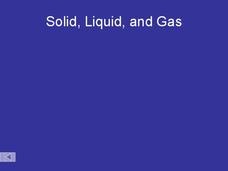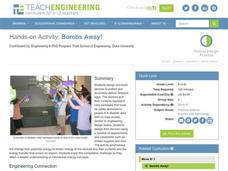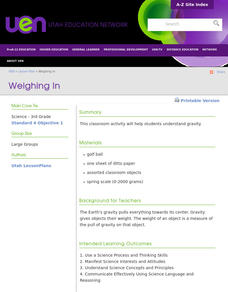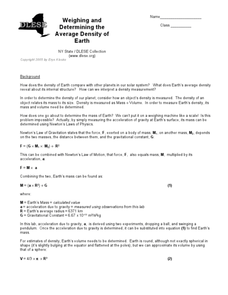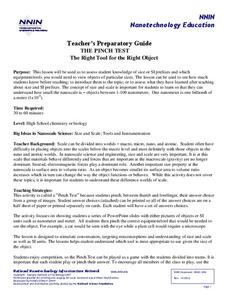Curated OER
Typical Numeric Questions for Physics I - Forces
Let's get moving! Newton juniors solve 19 problems using force, speed, and acceleration equations. This is a nifty worksheet that includes a few diagrams and multiple choice selections for each question. It provides the straightforward...
Curated OER
Solid, Liquid, and Gas
Delve into the differences among solids, liquids, and gases with this PowerPoint. It is both applicable and attractive. Large, colorful diagrams display the molecular arrangement of each state of matter and their properties are arranged...
Curated OER
Physics 152 ~ Fall 2003 Midterm Exam #3, Parts A, B
Illuminated physics stars show what they know about light by taking this exam. They match several related vocabulary terms to descriptions and answer multiple choice questions about the characteristics of light, magnification, and...
Curated OER
Gravity Study Guide
In this gravity worksheet, students define terms such as free fall, terminal velocity, and inertia. Then students compare the different types of forces that act upon objects. This worksheet has 9 short answer and 4 fill in the blank...
Curated OER
Universal Gravitation
Students create a KWL chart about gravity. In this astronomy class, students investigate the nature of gravity. They discuss common misconceptions and address them.
Curated OER
Acceleration, Drag, Gravity, Motion, Forces, and Friction
Eighth graders build and run mousetrap cars in order to measure distance, time, and mass for their cars. They use these measurements to calculate average speed and kinetic energy, then create a slide show to visually explain how the car...
Curated OER
Rules of Force and Motion
Students view a video and complete experiments with force and motion. In this force and motion lesson, students examine small pieces and how they affect the motion of a toy car. Students also experiment with sand paper,...
Curated OER
Keep In Touch: Communications and Satellites
Fourth graders explore communications by reading assigned space science text. In this satellite instructional activity, 4th graders identify the concept of orbiting and examine gravitational pull by viewing diagrams. Students are...
Curated OER
Bombs Away!
Students design and build a device to protect and accurately deliver a dropped egg. They review and study a number of vocabulary words that are associated with this lesson. They work in a small group in order to develop a successful...
Curated OER
Properties of Air
Pupils conduct investigations to demonstrate and learn that air takes up space, and puts pressure, or pushes, on everything around it. They conduct experiments to learn about feeling air pressure and measuring air pressure. Prior to...
Curated OER
Zigzag Seeds
Students observe the effects of gravity on seeds. Students place seeds in various orientations and record their growth to determine how gravity affects the seeds' growth.
Curated OER
Weighing and Determining the Average Density of the Earth
Some background information about density and Newton's Laws of gravitation and motion assist pupils in the following experiment. The procedure will help them further their understanding of gravity, pendulums, and a drop-ball experiment....
Curated OER
Exploring the Water Cycle
The water cycle is one of earth's most easily observable processes, but demonstrating each step within classroom walls can be a challenge. Through a series of videos and quick demonstrations, cover each aspect of the hydrologic cycle in...
New Mexico State University
Lab 6: Kepler's Laws
A 15-page package thoroughly teaches your physics or astronomy learners about Kepler's three laws of planetary motion. Each one is stated and explained. Class members answer questions, solve problems, and participate in the classic...
Curated OER
F = ma, Inertia, and Action-Reaction
Fourth graders apply concepts of Newton's Laws in scientific inquiries. Use this lesson to have your charges test and identify the characteristics of objects that make them easier or harder to push. After a teacher-led demonstration,...
Glynn County School System
Our Sun
The sun is responsible for almost 99 percent of the solar system's mass. As an essential part of our lives, the sun has many important features. A PowerPoint lesson presents information about features such as sunspots, the magnetic...
Curated OER
Water Cycle Reading and Writing
Here is a great way to get pupils to express a scientific concept in a fun way. After hearing the story of Walter the Water drop and learning facts about the water cycle, the class will write a creative expository piece describing what...
Physics Classroom
From a Feather to an Elephant
It is always a rush to drop objects from great heights, and with this physics experiment, class members will not be disappointed! They drop a single coffee filter from a balcony or table top, record the time it takes to reach the ground,...
Curated OER
The Solar System and Beyond
What an inspiring PowerPoint! The color scheme and pictures all contribute to the scientific style of this PowerPoint and will keep the attention of your junior high kids. The diagrams help illustrate the positioning of the moon, sun and...
Virginia Department of Education
Mineral Identification
What's the difference between a rock and a mineral? And what properties are used to identify minerals? The first installment of a five-part series on earth materials and processes prompts young scientists to identify a set of...
California Academy of Science
Carbon Cycle Role Play
Anytime you make concepts clear with role playing or hands-on experience, it's a win for the whole class. Ping-Pong balls are used to represent carbon in a carbon cycle role-play activity. In small groups, children first discuss what...
Laboratory for Atmospheric and Space Physics
Looking to the Future
New Horizons set forth on a mission to Pluto in 2006. Ten years later, the spacecraft is still on its way. Here, enthusiastic scholars predict what they will be like—likes, dislikes, hobbies, etc.—when New Horizons arrives at its...
National Nanotechnology Infrastructure Network
The Pinch Test
Test your pupils' understanding of the scale from macro to atomic. While displaying images of different materials, learners identify what they would need to make that material visible. Their choices range from the human eye to an...

